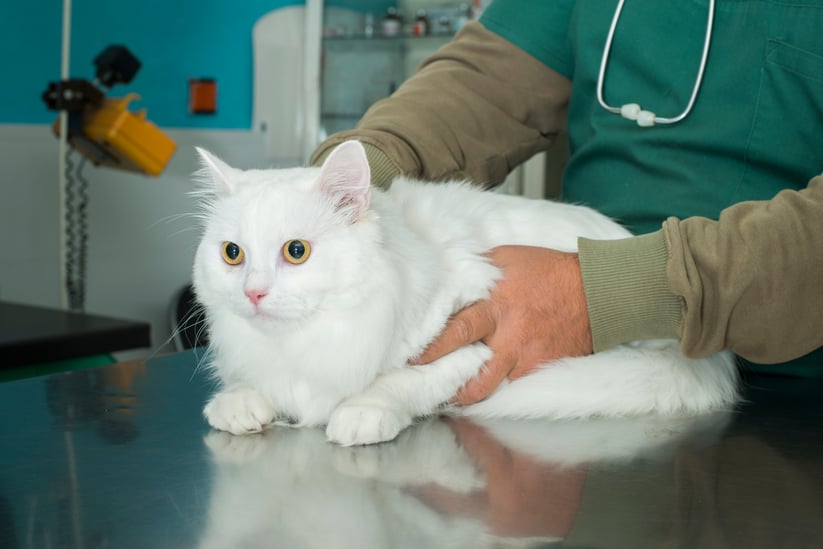
Remember playing madlibs as a kid? A Mad Lib is an interactive story that you add words to. When prompted, you insert a specific type of word. Once all words are added, the story is ready. Here is one for you to try, Vet Tech style!
Read More
Remember playing madlibs as a kid? A Mad Lib is an interactive story that you add words to. When prompted, you insert a specific type of word. Once all words are added, the story is ready. Here is one for you to try, Vet Tech style!
Read More
Even if you do not work in an emergency setting, emergencies will inevitably arrive at the doorstep of your daytime practice.
It is important to recognize an emergency, and more importantly a critical patient, so that immediately life-threatening problems can be quickly addressed.
Read More What is Vestibular Syndrome? Vestibular syndrome describes a neurologic condition encompassing specific neurologic symptoms and it can be a peripheral or a central disease and has various causes.
Read More
What is Vestibular Syndrome? Vestibular syndrome describes a neurologic condition encompassing specific neurologic symptoms and it can be a peripheral or a central disease and has various causes.
Read More
Urethral obstruction is a life threatening emergency in cats. It is mostly seen in young to middle-aged obese male neutered cats, but any cat can be affected. It is important to know and recognize symptoms of this disease. Male cats that have cystitis (Feline Lower Urinary Tract Disease or Feline Urologic Syndrome) are at a greater risk for obstruction.


I have been using coconut oil for quite some time after reading the long list of benefits it offers humans. I cook with it, I use it on my kids' skin after baths, and I use it on my face. I had read a post about a 50-year old woman who looked to be in her 30's. Her secret? Sunscreen and coconut oil she claims. Well, probably great genetics too. But I figured if it is natural, isn't harmful, and is potentially beneficial, why not use it? And if it is so good for me, what about my dog or our pet patients?
Coconut oil is mostly saturated fats (about 90%), with a few unsaturated fatty acids. Most saturated fats in coconut oil are Medium Chain Triglycerides, of which the main component is lauric acid. The health benefits of coconut oil mostly come from the MCTs because lauric acid has antibacterial, antiviral, and anti-fungal properties.
Read MoreXylitol is a sugar alcohol found in many sugarless candies and gums, baked goodies, cereals, and drinks. It can be VERY toxic to our pet patients. One of the most significant side effects seen with xylitol ingestion is hypoglycemia. It has also been suggested as possible cause of acute liver failure, which can lead to coagulopathy, disseminated intravascular coagulation (DIC), and death.

Xylitol is appearing in more foods and most recently has been noted in certain peanut or nut butters. This is concerning, as many pet owners administer medications in peanut butter, or use it in Kongs or other toys.
Read More
Veterinary technicians are often the first person of contact for pets during emergencies or post-operative in the hospital. Therefore it is critical that a veterinary technician can recognize the signs and symptoms of pain. Pain management is an important part of patient care, and by implementing pain scoring in the monitoring of hospitalized patients, patients may receive the analgesia and attention they need. Animals may be very stoic and pain can sometimes be difficult to assess. The following suggestions are meant to help with pain scoring in our pet patients. Some physical characteristics below such as panting or trembling may not be pain related but may be due to nervousness or other medical disease so these symptoms are to be interpreted based on the whole status of the patient.
Read MoreIn the recent JAVMA May 2015, there was an article regarding what is listed on the pet food label and what is actually in the food when tested. I was a bit shocked by the findings, however I am not surprised that there may be some degree of cross-contamination in pet food facilities (much like the label on human foods that states "made in a facility that processes peanuts.")
However, according to the JAVMA article, "about 40 percent of dog and cat foods tested in a recent study (Food Control 2015; 50: 9-17), may have contained meats different from those listed on the product labels." WOW! 40 percent is a huge number! The tests conducted by this study were based on DNA results of the animal products found in the pet foods. Another reference was published by Laura Allred, PhD, who showed in her 2012 study that via ELISA testing 10 out of 21 commercial dog foods contained species that were not declared on the label or WERE MISSING SPECIES THAT WERE DECLARED! That's right, that bag of dog food with chicken listed as the second ingredient may not even contain any chicken. To me, that is by far the worst.
Read MorePets will lose about 75% of their renal function before azotemia is noted on the labwork. This is why staging is important to determine how far underlying renal disease has progressed, so that supportive measures and appropriate intervention can take place.
What is Chronic Kidney Disease?
Chronic renal disease is kidney disease that has been going on for months or years (longer term). This is different than acute renal failure which occurs suddenly and more severe (such as with antifreeze or lily toxicity). There are many possible causes of chronic kidney disease including:
The kidneys contain thousands of nephrons (the functional unit of the kidney). The kidneys help to filter blood waste (from toxins, foods, cells, etc.), conserve water and electrolytes, and regulate calcium and Vitamin D levels. They also produce erythropoietin which helps the body to make new red blood cells.
Read MoreWhat is Plague?
Plague is a disease caused by the bacterium Yersinia pestis. You may have recently heard about it in the news, as the first case of a dog to human transmission was reported in Colorado.
Dog Transmits Plague to Its Owner
How is it Transmitted?
Plague is most common in the Western to Mid-Western states, and is mostly seen where there is a high incidence of infected rodents such as prairie dogs. The bacteria are carried by fleas. When an infected flea bites an animal, the bacterium is transmitted and continues to spread in this manner, by the flea taking meals from infected animals and going on to the next. Dogs or cats running around outside chasing or eating vermin are at a higher risk of getting infected as the disease is transmitted through infected bodily fluids. Cats are very susceptible and are a more common source of infection in humans.
Read MoreThere is currently a severe outbreak of Canine Influenza Virus (CIV) in the Chicago area, on the brink of being an epidemic, which you may have seen in the news. The disease has caused more than a thousand cases and the death of at least 5 dogs from January through March (as reported by the Chicago Tribune). Chicago Tribune: Canine Influenza Article and Video
Read MoreIn the news recently, the debate about vaccinations for children was at the forefront during the measles outbreak. There has been a similar debate going on in the veterinary community about vaccines for pets. Clients are electing not to vaccinate their pets or are inquiring about why they should, and if they really need to vaccinate their pets every 3 years? What is the appropriate and recommended protocol? Are we currently over-vaccinating?
In 2011, the American Animal Hospital Association (AAHA) recommended that ALL of the core vaccines go to a 3-year protocol while also stating that “among healthy dogs, all commercially available (core) vaccines are expected to induce a sustained protective immune response lasting at least 5 years.” Many clients and professionals will still argue that an every 3-year protocol is still over-vaccinating and in fact most adult animals will have lifelong immunity without the need for repeated vaccination. Should we go to a 5 year or longer protocol for the DHPP and FVRCP vaccines?
Read MoreIt isn't all that uncommon. A client has a dog that has been bitten or exposed to a rabies "suspect." Whether it be a fox, a skunk, coyote, or bat, any wild animal could be a potential hazard for transmitting rabies to our domesticated pets.
State law is very strict regarding pets and exposure to rabies. There was a story in October 2014 that raised some controversy over this issue. A 10-year old Schnauzer was bit by a rabid skunk. The dog's rabies vaccine had only expired 10 days prior to the attack. The options were to euthanize the dog, or quarantine for 3 months in a kennel with then another 3 months of strict home confinement. The owner was devastated but ultimately chose euthanasia.
For currently vaccinated pets exposed to rabies, they must receive a rabies booster immediately and then be under home confinement for 45 days.
Read MoreVTNE® is a registered trademark owned by the American Association of Veterinary State Boards. This web site is not licensed by, endorsed by, or affiliated with the American Association of Veterinary State Boards.
© 2000-2026 VetTechPrep.com, Inc. · All rights reserved.